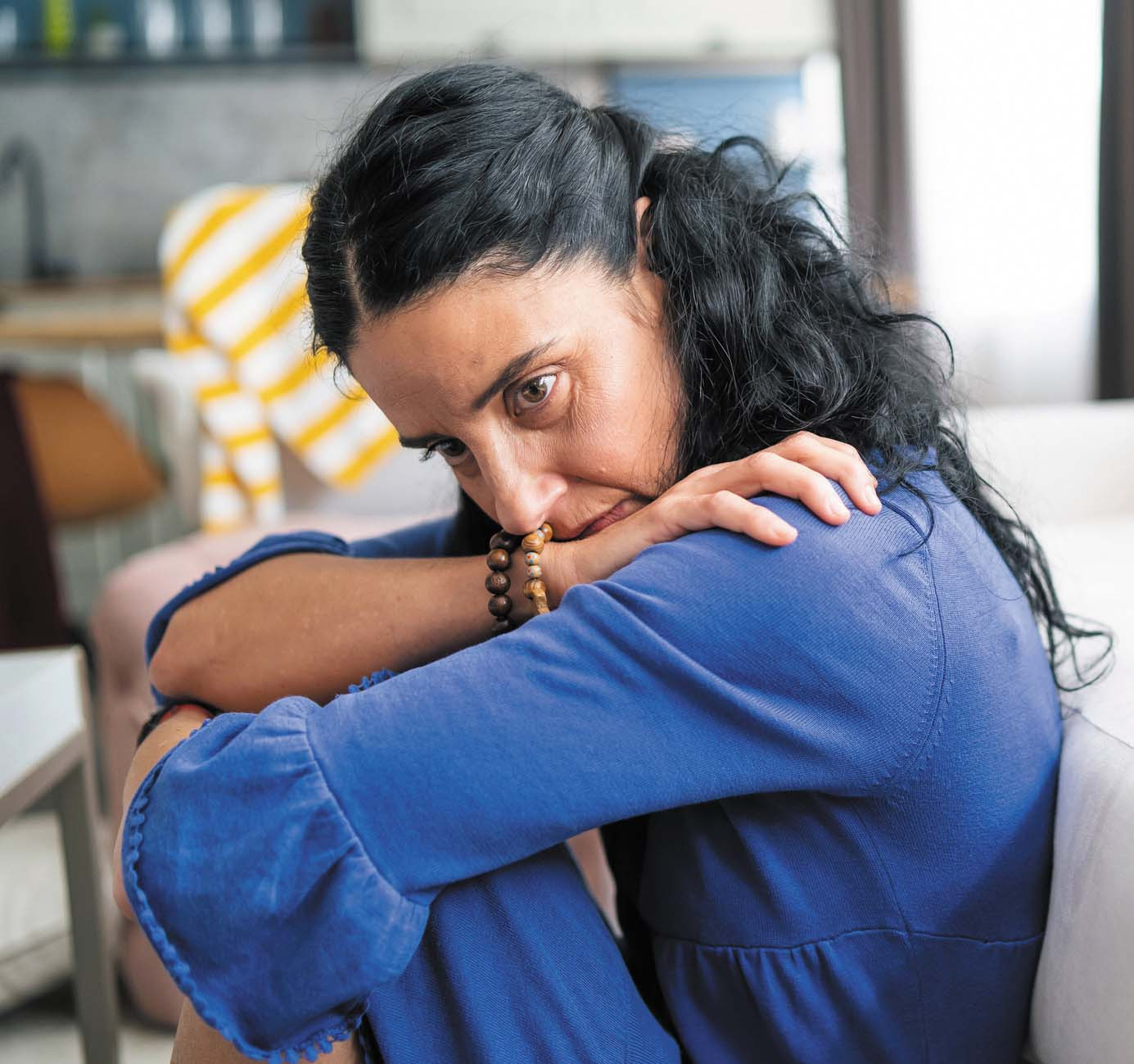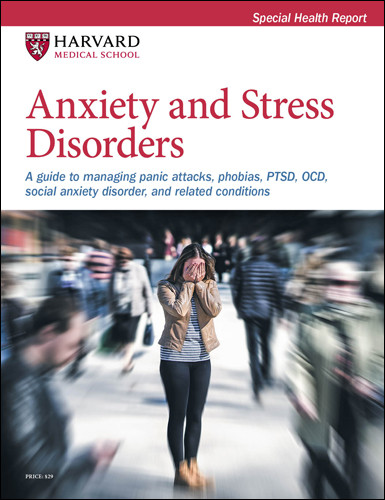Afraid to visit the doctor?
You're not alone if medical anxiety is endangering your health.
- Reviewed by Toni Golen, MD, Editor in Chief, Harvard Women's Health Watch; Editorial Advisory Board Member, Harvard Health Publishing; Contributor

Even after many years of seeing Dr. Daniel Sands, a primary care doctor at Harvard-affiliated Beth Israel Deaconess Medical Center, Maggie could best be described as a reluctant patient. "She was deathly afraid of doctors and hospitals and very anxious every time she came in, but knew she had to sometimes," Dr. Sands recalls.
But Maggie's hesitancy cost her dearly, preventing her from getting care that might have kept her healthier and stronger. She skipped vaccinations against illnesses that could worsen her chronic lung disease. And although she had terrible arthritis in her knees, she refused to even consider joint replacement surgery to make her more comfortable and mobile.
Maggie (whose name has been changed to protect her privacy) is a prime example of medical anxiety, a sometimes crippling fear of doctors and medical settings. It's a pervasive issue: in 2023, nearly half of American adults reported feeling anxious before a doctor's appointment, an increase from 39% the previous year, according to a nationally representative survey of 2,000 people by market research company OnePoll.
Dr. Sands sees patients with medical anxiety once or twice a month and encounters a severe case like Maggie's a few times a year. But four in 10 adults polled in 2023 said their anxiety compels them to put off seeing a doctor — a decision with potentially wide-ranging health implications.
Serious consequences
Why is health care hesitancy dangerous? It can dissuade people from seeking ongoing monitoring (such as cholesterol and blood pressure checks) or cancer screenings (such as mammograms and colorectal exams). Such anxiety can even stop some people from taking care of serious issues that might shorten their lives.
"So much of what we do depends on follow-up," Dr. Sands says. "If you miss a cancer screening, you have a higher risk of developing cancer. With uncontrolled high blood pressure, you could have a stroke or heart attack or develop kidney or heart failure. Poorly controlled diabetes greatly increases the risk for heart attacks, kidney failure, blindness, and even amputations."
"Depending on what the problem is, all those things are at play," he says. "At worst," he adds, "you could die before your time."
List of triggers
Medical anxiety differs from health anxiety or hypochondria, which involves an extreme preoccupation with developing serious illnesses such as cancer, heart problems, or neurological illnesses. But it may overlap with "white-coat hypertension," a surge in blood pressure experienced by as many as 30% of people when measured during a doctor's visit, according to American Heart Association research.
For these folks, white-coat hypertension is essentially a fight-or-flight response marked by an increase in stress hormones. The trigger might be the stress of getting to the doctor's, or just the sight of a doctor. (The reaction is named for the traditional white lab coat many clinicians wear.) "It might be the antiseptic smell of the doctor's office," Dr. Sands says. "And for some people, it might just be being touched."
People who have undergone trauma or abuse may be especially prone to medical anxiety, Dr. Sands says. What else can provoke fear? Needles or shots are on the list, along with the prospect of a painful test or procedure or receiving bad news or a serious diagnosis. Those latter two reasons were cited by about 40% of the 2023 poll respondents who reported medical anxiety.
Try relaxation techniques. Meditation or deep breathing can help allay anxiety while you're in the waiting room. "It's a great way to relax and bring your blood pressure down," Dr. Sands says.
Does asking for a second opinion insult your doctor?If your home needed a new roof, you might get quotes from several companies before making such a weighty financial decision. So why wouldn't you seek advice from more than one doctor if you're facing a weighty medical matter? Seeking a second opinion is fairly common. But some people are concerned their doctor would be insulted by the request—though they shouldn't be, says Dr. Daniel Sands, a primary care doctor at Beth Israel Deaconess Medical Center. "Patients should feel comfortable asking for a second opinion," Dr. Sands says. "It shouldn't be a personal affront or a matter of ego to a doctor—it should be a matter of being open to hearing what another health professional says." Most situations don't call for a second opinion. You don't need one for a minor health problem. And if you're pleased with your care, you don't need to ask if another doctor would approach it differently. But wanting a second opinion doesn't necessarily mean you don't trust your doctor. In certain situations, it's just wise to do so—especially if you need major surgery or cancer treatment, Dr. Sands says. "For any life-changing diagnosis or potentially fatal condition, a second opinion is called for," he says. "Cancer is a good example, since there may be more than one way to treat it, so it might be worthwhile to get information from two or three separate places." If you feel trepidation about asking for a second opinion, Dr. Sands offers this approach. "Ideally, I'd say, 'I appreciate the time you spent with me and the thought you've put into this. I think you'll understand why I'd like to get a second opinion. Is there someone you recommend I consult with?' A lot of times, they'll point you toward someone specific," he says. If you're uncomfortable with that tactic, Dr. Sands suggests speaking with your primary care doctor and asking for her guidance. "She can help set up a second opinion," he says. If your doctor does seem insulted by your request, you don't need to confront her—but you should still follow your instincts. "End your appointment in a normal way and seek a second opinion elsewhere," Dr. Sands says. |
Ways to cope
Anxiety about medical care doesn't usually exist in a vacuum, Dr. Sands says. People with it often have generalized anxiety that also crops up outside of health care settings. "In my experience, going to the doctor only makes it worse," he says.
Dr. Sands recommends that people with medical anxiety seek treatment, which may include psychotherapy, medication, or both. "These kinds of situations often call for professional help," he says.
He offers these additional coping strategies if doctors or medical settings make you anxious:
Identify what worries you. Doing so may take its power away or prod ideas about how to respond. "If you can identify your triggers, you can try to talk yourself through them," he says. "But you should also share them with your doctor. If your doctor doesn't ask, say, 'These are things that make me concerned or anxious.'"
Do a cost-benefit analysis. Weigh the long-term health benefits of getting needed health care against your short-term discomfort. This is perhaps easier said than done when you're anxious, Dr. Sands acknowledges.
Bring someone along. Having a trusted companion at your side during your appointment can calm frayed nerves.
Request sedatives. Short-acting medications may help you stay more relaxed during anxiety-provoking procedures, but they can also involve drawbacks, such as being unable to drive afterward. For more involved, longer procedures, your doctor may have the option to perform them under anesthesia. Using either sedatives or anesthetics involves carefully weighing the risks and benefits. Ask your doctor about the pros and cons.
Image: © valentinrussanov/Getty Images
About the Author

Maureen Salamon, Executive Editor, Harvard Women's Health Watch
About the Reviewer

Toni Golen, MD, Editor in Chief, Harvard Women's Health Watch; Editorial Advisory Board Member, Harvard Health Publishing; Contributor
Disclaimer:
As a service to our readers, Harvard Health Publishing provides access to our library of archived content. Please note the date of last review or update on all articles.
No content on this site, regardless of date, should ever be used as a substitute for direct medical advice from your doctor or other qualified clinician.
















